|
|
|
Sort Order |
|
|
|
Items / Page
|
|
|
|
|
|
|
| Srl | Item |
| 1 |
ID:
109713
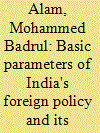

|
|
|
| 2 |
ID:
126733
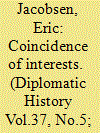

|
|
|
|
|
| Publication |
2013.
|
| Summary/Abstract |
This article will demonstrate that in 1963 the administration of President Kennedy helped create a Ba'th regime in Iraq and then provided it with assistance in order to secure U.S. interests, including access to oil and the containment of both Communism and Arab nationalism. On February 8, 1963, the Ba'th overthrew the dictatorship of General 'Abd-ul-Karim Qasim, an Iraqi nationalist who was seen by both the Eisenhower and Kennedy administrations as a threat to U.S. interests. U.S. policy makers provided the Ba'th regime with military and economic assistance, including sales of military equipment, credits for agricultural surpluses for credit under Public Law 480, and Export-Import Bank loans. Policy makers also encouraged private U.S. businesses to sign contracts with Iraq, supplied the Ba'th regime with ammunition to use against Kurdish rebels, used the Central Intelligence Agency to provide it military equipment, and ignored the Export-Import Bank's policy that prohibited financing arms sales.
|
|
|
|
|
|
|
|
|
|
|
|
|
|
|
|
| 3 |
ID:
118309
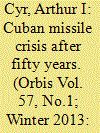

|
|
|
|
|
| Publication |
2013.
|
| Summary/Abstract |
The fiftieth anniversary of the October 1962 Cuban missile crisis is an appropriate time to review the events, which arguably were the closest the world has come to general nuclear war. The crisis was preceded by growing tensions between Moscow and Washington, and increasing Cuba emphasis in U.S. domestic politics. Analysts have differed on motives for trying to place long-range missiles in Cuba; Soviet officials consistently emphasized defense of Cuba. Revelations since the crisis indicate war was even closer than realized at the time. President John F. Kennedy deserves considerable credit for resisting military pressures.
The Cuban Missile Crisis of October 1962 arguably was the closest the world has come to nuclear war since the beginning of the nuclear era in 1945, and for that reason alone has been the focus of notable theatrical and literary products as well as scholarly analysis. The crisis has been described as President John F. Kennedy's "finest hour" in a touchingly brief tenure in the White House, and also as the direct result of weakness and miscalculation in the administration of that same American chief executive. Crisis management, a popular subject for analysis even before the crisis, received a major boost in visibility as a result of this unprecedented confrontation. The colorful personalities involved on both sides, including unpredictable Soviet Premier (Chairman of the Council of Ministers) Nikita Khrushchev, as well the photogenic and public relations-conscious U.S. leader, and some of their immediate advisers, have added to both human interest and dramatic potential. Finally, the crisis led to changes in strategic policies on the part of the United States and the Soviet Union, and their immediate allies. For these reasons and others, the half-century anniversary of the events merit a fresh look, both to review previous analyses and discuss lessons which bear on present-and future-international relations.1
The perceptions and conclusions among informed students of the Cuban Missile Crisis generally have shifted over the decades. At least in the United States, and among the international strategic studies community more generally, the initial reactions were generally laudatory of Kennedy and his men. Nuclear war had been avoided, while the goal of the removal of Soviet missiles from Cuba was achieved. Walt W. Rostow, a member of the Kennedy administration who later became national security adviser to President Lyndon B. Johnson, described the crisis as "the Gettysburg of the Cold War," a characteristic observation from this highly theoretical academic, but one which reflected wider sentiment. Later in the 1970s, as plots involving the U.S. government in efforts to assassinate Fidel Castro came to light, the Kennedy administration was regarded in a more critical light. During the same decade, information became public regarding JFK's reckless behavior in his personal life. That led at least some to analyze policies and politics of his administration with a much more critical perspective.2
|
|
|
|
|
|
|
|
|
|
|
|
|
|
|
|
| 4 |
ID:
114700
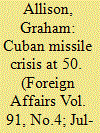

|
|
|
|
|
| Publication |
2012.
|
| Summary/Abstract |
Fifty years ago, the Cuban missile crisis brought the world to the brink of nuclear disaster. During the standoff, U.S. President John F. Kennedy thought the chance of escalation to war was "between 1 in 3 and even," and what we have learned in later decades has done nothing to lengthen those odds. We now know, for example, that in addition to nuclear-armed ballistic missiles, the Soviet Union had deployed 100 tactical nuclear weapons to Cuba, and the local Soviet commander there could have launched these weapons without additional codes or commands from Moscow. The U.S. air strike and invasion that were scheduled for the third week of the confrontation would likely have triggered a nuclear response against American ships and troops, and perhaps even Miami. The resulting war might have led to the deaths of 100 million Americans and over 100 million Russians.
|
|
|
|
|
|
|
|
|
|
|
|
|
|
|
|
| 5 |
ID:
034870
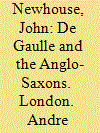

|
|
|
|
|
| Publication |
London, Andre Deutsch, 1970.
|
| Description |
viii, 374p.Hbk
|
| Contents |
Includes index.
|
| Standard Number |
0233961623
|
|
|
|
|
|
|
|
|
|
|
|
Copies: C:1/I:0,R:0,Q:0
Circulation
| Accession# | Call# | Current Location | Status | Policy | Location |
| 005796 | 923.144/NEW 005796 | Main | On Shelf | General | |
|
|
|
|
| 6 |
ID:
171280
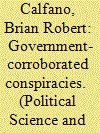

|
|
|
|
|
| Summary/Abstract |
Accusations of conspiracy are nothing new in American politics, but examples in which the government—usually cast as a key player in conspiracy theories—goes on record to corroborate that a conspiracy occurred are rare. I leveraged an experiment that randomly exposes both college-student and general-public subject pools to information about the 1979 House Select Committee on Assassination report of a probable conspiracy in the assassination of President John F. Kennedy. I find that those exposed to government corroboration of a conspiracy (1) are more prone to anger in response to the government report; (2) engage in an increased search of available media information about the assassination; and (3) are more likely to agree with the conclusion of a conspiracy in Kennedy’s murder. Implications for additional research about government pronouncements on controversial issues and follow-on public reaction also are discussed.
|
|
|
|
|
|
|
|
|
|
|
|
|
|
|
|
| 7 |
ID:
030700
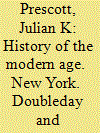

|
|
|
|
|
| Publication |
New York, Doubleday and company, Inc., 1971.
|
| Description |
viii, 418p.Hbk
|
|
|
|
|
|
|
|
|
|
|
|
Copies: C:1/I:0,R:0,Q:0
Circulation
| Accession# | Call# | Current Location | Status | Policy | Location |
| 015730 | 909.0904/PRE 015730 | Main | On Shelf | General | |
|
|
|
|
| 8 |
ID:
070434
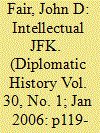

|
|
|
| 9 |
ID:
121706
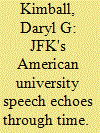

|
|
|
|
|
| Publication |
2013.
|
| Summary/Abstract |
In the modern age, U.S. presidents have delivered dozens of addresses on international peace and security, but few have been as profound or consequential as John F. Kennedy's "Strategy of Peace" address delivered 50 years ago on June 10 on the campus of American University in Washington.
|
|
|
|
|
|
|
|
|
|
|
|
|
|
|
|
| 10 |
ID:
045408
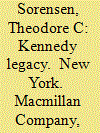

|
|
|
|
|
| Publication |
New York, Macmillan Company, 1969.
|
| Description |
414p.Hbk
|
|
|
|
|
|
|
|
|
|
|
|
Copies: C:1/I:0,R:0,Q:0
Circulation
| Accession# | Call# | Current Location | Status | Policy | Location |
| 022781 | 923.173/SOR 022781 | Main | On Shelf | General | |
|
|
|
|
| 11 |
ID:
124745
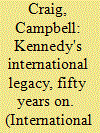

|
|
|
|
|
| Publication |
2013.
|
| Summary/Abstract |
This article explores historical assessments of the foreign policy of President John F. Kennedy, who was assassinated fifty years ago. It traces the evolution of JFK historiography from the uncritical so-called 'Camelot' school to harsh revisionist critiques in the 1980s and 1990s, and on to the current 'third wave' of scholarship. The article focuses in particular on new work concerning JFK's handling of the Berlin and Cuba superpower crises, his role in expanding the United States' involvement in Vietnam (and whether blame for this war can be assigned to him) and larger questions about his approach to the danger of nuclear holocaust and the possibility of defusing Cold War tensions. The conclusion to the article examines his various peace-seeking initiatives in the months following the Cuban Missile Crisis, and suggests that Kennedy may have been turning towards a more critical view of American Cold War politics when he was killed in Dallas in November 1963
|
|
|
|
|
|
|
|
|
|
|
|
|
|
|
|
| 12 |
ID:
118390
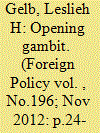

|
|
|
| 13 |
ID:
107210
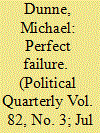

|
|
|
|
|
| Publication |
2011.
|
| Summary/Abstract |
In 1961 the US Central Intelligence Agency master-minded a sea-borne invasion by Cuban exiles aimed at overthrowing the regime headed by Fidel Castro. With minimal logistical support from the USA the attempted counter-coup launched at the Bay of Pigs was an unqualified disaster: a 'perfect failure', in the words of an authoritative contemporary. This essay locates the fiasco in the longer history of US-Cuban relations, concentrating on the Cold War years, the history of US political intervention and subversion in Latin America, and the dictatorship of Fulgencio Batista and the rise of Castro himself-both men offering different models of Latin American caudillismo (the power and cult of military strongmen). The essay concludes with an analysis of Cuba as an issue in US domestic politics and the impact of the Bay of Pigs in consolidating the Cuban revolution and setting the framework for the Cuban Missile Crisis of October 1962.
|
|
|
|
|
|
|
|
|
|
|
|
|
|
|
|
| 14 |
ID:
048698
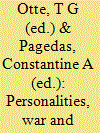

|
|
|
|
|
| Publication |
London, Frank Cass Publishers, 1997.
|
| Description |
xii, 291p.Hbk
|
| Standard Number |
0714648183
|
|
|
|
|
|
|
|
|
|
|
|
Copies: C:1/I:0,R:0,Q:0
Circulation
| Accession# | Call# | Current Location | Status | Policy | Location |
| 039445 | 909.8/OTT 039445 | Main | On Shelf | General | |
|
|
|
|
| 15 |
ID:
115343
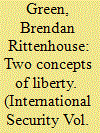

|
|
|
|
|
| Publication |
2012.
|
| Summary/Abstract |
Contrary to conventional accounts, the United States did not immediately adopt a set of sweeping commitments to Europe after World War II. Instead, it pursued a buck-passing strategy until the early 1960s that sought to craft Western Europe into an independent pole of power capable of balancing the Soviet Union largely without the assistance of the United States, thereby facilitating the withdrawal of U.S. troops from the continent. Only under President John F. Kennedy did the United States adopt a balancing strategy, making permanent forward commitments to the defense of Europe. A new theory of liberal ideas and foreign policy explains this shift. "Negative liberals," who see freedom in terms of opportunity and minimal state intervention, adopted a buck-passing strategy to pass the costs of foreign policy to other actors and minimize state intrusion at home. "Positive liberals," who see freedom as the exercise of capabilities and often welcome state intervention, had no such compunctions. Starting with Kennedy, positive liberals welcomed firmer balancing commitments in part as a measure to protect the liberal regimes that had emerged in Western Europe after World War II.
|
|
|
|
|
|
|
|
|
|
|
|
|
|
|
|
| 16 |
ID:
089217
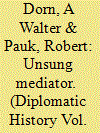

|
|
|
|
|
| Publication |
2009.
|
| Summary/Abstract |
On October 16, 1962, President Kennedy learned that the Soviet Union was building nuclear missile installations in Cuba. For the next six days the president and his advisers secretly deliberated about the American response. The new threat not only upset the nuclear balance but also placed nuclear missiles capable of destroying most U.S. cities on the territory of a new enemy, Premier Fidel Castro. As the Kennedy administration strove to keep this alarming news secret, it nevertheless shared it with the new acting secretary general of the United Nations, a quiet unassuming Burmese diplomat named U Thant.2 Specifically, on Saturday, October 20, 1962, Admiral John McCain, military adviser at the U.S. Mission to the United Nations, informed Thant's military adviser, Major General Indar Jit Rikhye, about the missiles.3 General Rikhye went to the Pentagon for a secret briefing and received an album of U.S. photos of the menacing missiles,4 which he showed to Thant. Two days later, on Monday, October 22, Rikhye informed Thant that Kennedy would be making an important television broadcast that evening concerning the missiles. Thant conferred with the U.S. ambassador to the United Nations, Adlai Stevenson,5 and a few hours later watched Kennedy make one of the most momentous presidential speeches of the century. The president announced a "naval quarantine" of Cuba, pushing the world closer to nuclear war than ever before. In the deepening crisis, the United Nations, and specifically Secretary General Thant, was to play a significant role in de-escalating and then resolving the nuclear standoff between the superpowers. Thant (Figure 1) sent appeals and messages, relayed proposals, offered reassurances, advanced the "noninvasion for missiles" formula that formed the basis of the final agreement, shuttled to Cuba to mollify Castro, and helped secure a verification arrangement.
|
|
|
|
|
|
|
|
|
|
|
|
|
|
|
|
|
|
|
|
|